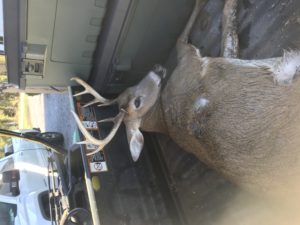Wild Game Food Safety – From Field to Table 2022
go.ncsu.edu/readext?883999
en Español / em Português
El inglés es el idioma de control de esta página. En la medida en que haya algún conflicto entre la traducción al inglés y la traducción, el inglés prevalece.
Al hacer clic en el enlace de traducción se activa un servicio de traducción gratuito para convertir la página al español. Al igual que con cualquier traducción por Internet, la conversión no es sensible al contexto y puede que no traduzca el texto en su significado original. NC State Extension no garantiza la exactitud del texto traducido. Por favor, tenga en cuenta que algunas aplicaciones y/o servicios pueden no funcionar como se espera cuando se traducen.
Português
Inglês é o idioma de controle desta página. Na medida que haja algum conflito entre o texto original em Inglês e a tradução, o Inglês prevalece.
Ao clicar no link de tradução, um serviço gratuito de tradução será ativado para converter a página para o Português. Como em qualquer tradução pela internet, a conversão não é sensivel ao contexto e pode não ocorrer a tradução para o significado orginal. O serviço de Extensão da Carolina do Norte (NC State Extension) não garante a exatidão do texto traduzido. Por favor, observe que algumas funções ou serviços podem não funcionar como esperado após a tradução.
English
English is the controlling language of this page. To the extent there is any conflict between the English text and the translation, English controls.
Clicking on the translation link activates a free translation service to convert the page to Spanish. As with any Internet translation, the conversion is not context-sensitive and may not translate the text to its original meaning. NC State Extension does not guarantee the accuracy of the translated text. Please note that some applications and/or services may not function as expected when translated.
Collapse ▲Virtual Recording available beginning Monday, September 12, 2022
Do you hunt or receive wild game meat from others? Are you confident in your safety practices in the field and kitchen to ensure quality meat for consumption and processing? Once you have dressed your harvest, now what? How do you handle wild game in the kitchen? How can you ensure the quality remains high and that foodborne illnesses will not become an outcome of future consumption?
Agents will:
- Start this class with field dressing, focusing on deer, though concepts are applicable to other hunts as well
- Discuss simple techniques to improve the food safety aspect of your harvest and help reduce the chance of any potential illness that could arise
- Review common foodborne illnesses and outcomes related to wild game
- Consider typical deer disease and trauma and view images of what to look for
- Review proper food handling in the kitchen and the basics of different preservation methods
While you may not be hunting yourself, these are great tips and helpful information to know and share with those who are donating meat to you.
 This class is being offered through N.C. Cooperative Extension agents in Hyde, Washington, Tyrrell, and Dare Counties. Participation is open to residents in any county, as this is a virtual recording! This video was taught and recorded in September 2020 and is required to be “attended” and viewed before moving on to in-person processing classes. After registered, you will be sent a YouTube link to this recording along with a short survey that covers the main points addressed. If you attended this class previously, you do not need to retake it.
This class is being offered through N.C. Cooperative Extension agents in Hyde, Washington, Tyrrell, and Dare Counties. Participation is open to residents in any county, as this is a virtual recording! This video was taught and recorded in September 2020 and is required to be “attended” and viewed before moving on to in-person processing classes. After registered, you will be sent a YouTube link to this recording along with a short survey that covers the main points addressed. If you attended this class previously, you do not need to retake it.
Our District 1 Biologist for the NC Wildlife Resources Commission also joined the class to answer more in-depth questions related to wildlife disease or trauma in our area and what you can do to help.
Registration is FREE and required: September 12 – December 5, ongoing, virtual class video
*Please note: This class will not go in-depth with preservation methods. We will be holding future classes for learning wild game processing and preservation and how to use and properly clean equipment for those methods. We will not be discussing in-depth techniques for full field-dressing of deer.
N.C. Cooperative Extension Agents:
CatieJo Black, Family & Consumer Sciences Agent, Hyde County
Rebecca Liverman, County Extension Director, Washington County
Dee Furlough, Family & Consumer Sciences Agent, Tyrrell & Dare Counties



